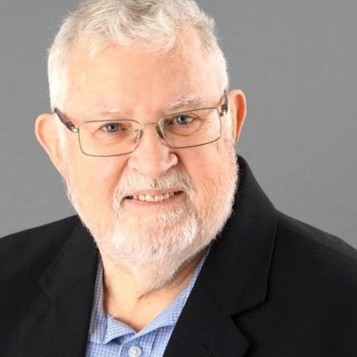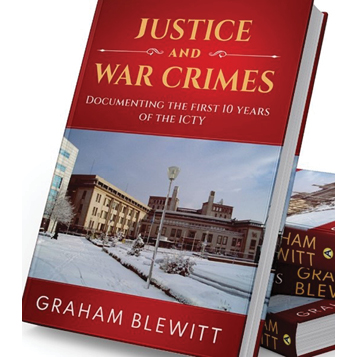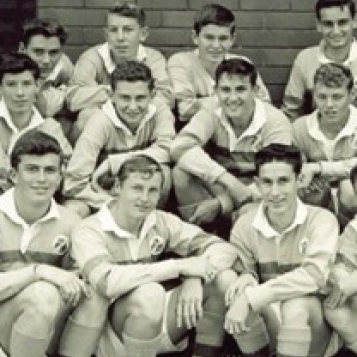Graham Blewitt, AM – From the Schoolyard to International Courtrooms
In the 1950’s one could find suburban Australian teenagers enjoying cricket on the streets up till dusk, as well as biking and exploring the bush along the local tracks and river. Graham Blewitt’s schooldays at De La Salle Kingsgrove was a world away from his focused jurist work in the sophisticated international court at The Hague, some decades later.
De La Salle College Kingsgrove and the 1950-60’s
Born in 1947, in the small country town of Gulargambone in the central western plains of New South Wales, he had his secondary schooling with the Brothers and lay teachers at the now-closed school in south-west Sydney. ”Baby boomers” those days had the freedom to not arrive home till the street lights came on, when out with mates. Making hydro-planes to navigate the swamps near the Georges River may have been more intriguing than the school books.
He remembered Br. Canisius at De La Salle with some admiration. A keen athlete and rugby league representative for the school, Graham graduated in 1964. There were other interests beyond the classroom. With four other school mates, he formed a rock band - the “After Fives”- in 1963, Graham playing keyboards.
“We were a successful covers band playing at parties and dance functions. A particular highlight for the band was performing each year at the University of NSW’s Regimental Ball. The group disbanded in about 1969 when life and study became a priority.”
A Law Career / the DPP
There was no vaunting ambition career-wise, but knuckling down to the public service exams for the first three years while working in the Justice Department, he was learning the ropes of the court system.
“Surprisingly, I found myself in the court room on my first day on the job in what is now the Office of the NSW Director of Public Prosecutions (DPP). I wore a black gown and performed the duties of a court officer. As a teenager in such a judicial environment, I was hooked. From that moment I knew I wanted to be in the courtroom for the rest of my life”.
Working in administration in the Office of the DDP led to law studies at Sydney University and juggling married life from 1969, and in the mid-1970’s taking up prosecutions in serious criminal cases.
Crime and Drug-Trafficking Work: “If opportunities come, take them!”
by 1982, graham became involved in organized crime investigations when he became a member of the Joint Commonwealth/State task force into drug trafficking and later as a member of a joint prosecution team investigating members of the Terrence Clark “Mr Asia” drug syndicate, following the royal commission into drug trafficking. He was also assigned to assist the coroner in the inquest into the Donald Mackay death and the involvement of the Griffith area Italian mafia. He was also chosen to lead the new Prosecution of Police Unit in the DDP.
Prosecuting War Criminals – Australia & Internationally
In his very busy 1980’s years, Graham, left the DDP in 1985 to join the National Crime Authority (NCA) as senior legal advisor. Later, through working with Robert (Bob) Greenwood QC he took up the role as Deputy, and then Director for 3 years, of the Special Investigations Unity (SIU – Nazi war criminals in Australia).
This foray into international criminal law led to what he admitted was the apex of Graham’s legal career. At the same time there was the more mundane and important work of raising his family of three children with his wife, and becoming a Cub Leader in his son’s scout’s group.
From 1994 till 2004 he lived in the Dutch city of The Hague as the Deputy Chief Prosecutor of the UN International Criminal Tribunal for the former Yugoslavia (ICTY). This meant a re-location of his family and living in a very vibrant workplace where most Dutch spoke English. In this highly responsible position, he could appreciate downtimes. The Australian embassy, he notes, was an important social meeting hub for expatriates; the restaurant scene was enlivening; the distinct seasons, especially spring bursting with colour with crocus, tulips, daffodils was a delight.
Graham mentions that re-location did not work out for his daughter’s progress at school, so his wife and daughter went back home for some years, in order for the latter to finish her secondary school. That sacrifice of family life was assuaged by successes: on May 24 1999, Serb President Slobodan Milosevic became the first sitting head of state to be charged with war crimes during an armed conflict. Along with four other high-ranking Serbian leaders, Milosevic was accused of offenses including murder, deportation, and persecution in the Kosovo war of 1998-99.
Graham, as deputy prosecutor, was “extremely proud of the work undertaken by the ICTY, the first international criminal tribunal since Nuremburg at the end of the Second World War.” He says that the structure of the prosecutor’s office and its procedures that he engineered was partly based on his work at the NCA and the SIU, and was in some ways the forerunner of the current permanent International Criminal Court.
In addition, Graham sees the ICTY as having established that the crime of rape could constitute the crime of torture, a crime against humanity. Recognition for his achievements in international humanitarian law came with Membership of the Order of Australia in 2000. Seeing his dying father knowing of his son’s honour is a special memory: “when I approached his hospital bed, he looked at me proudly, holding the newspaper clipping.”
The Magistrate & Children’s Welfare
On return to Australia in 2004, at 57 years of age, he was approached by the Attorney-General’s Office to take up the magistracy. This he did, first in the Local Court and then for 12 years in the Children’s Court – the Illawarra Circuit and Campbelltown. This work was very rewarding, challenging and involved great responsibility, says Graham – specially in the care and protection jurisdiction, involving young children being placed in foster care etc. The Children’s Court was “bread and butter” for him having regard to his criminal law background.
A lifetime in the law gives no regrets, says Graham, and in his retirement, there is time to write two books - “Justice and War Crimes,” on the ultimate success of the ICTY and the second about the work of the SIU’s investigations and prosecutions of Nazis in Australia. There is also the opportunity taken up to organize the 60th Year Reunion of his De La Salle class, which occurred in March 2024.
“If opportunities come, take them!”


Source: Br Gary Wilson, Creative Writer.
- Log in to post comments

